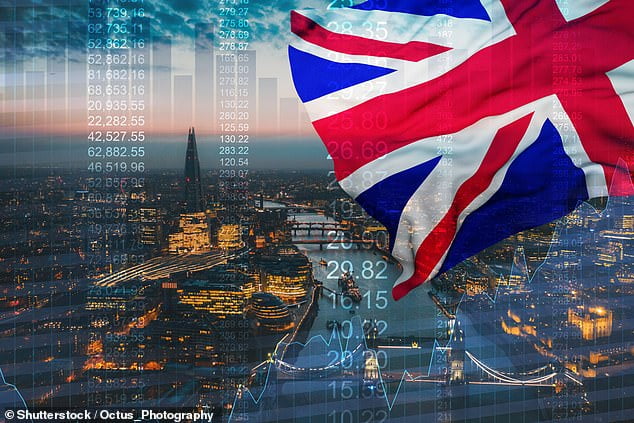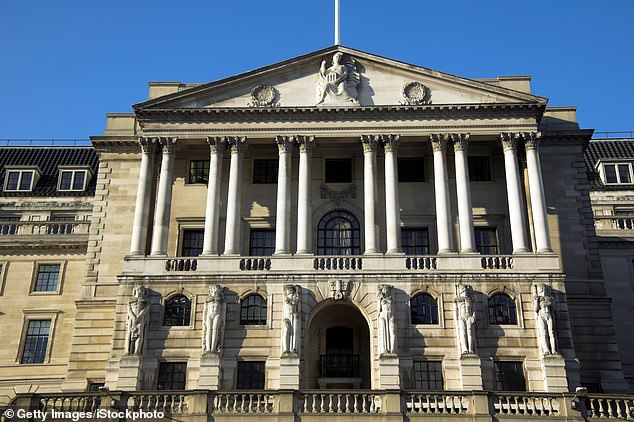Things can surely only get better, says HAMISH MCRAE
>
What a year! If you’re glad 2022 is over, as most of us surely are, the challenge is figuring out why 2023 might be better.
That is not easy, because the troop of recent months has received new recruits.
There are now clear signs that the global downturn has begun, economic dislocation in China is mounting, and while inflation is finally easing, the effect of higher interest rates has yet to spread across the economies of the developed world – including ours .

Difficult year: There are now clear signs that the global downturn has begun
For investors, the challenge at this point in the economic cycle is always to assess how many of these issues are “in the market.”
That is, to what extent last year’s fall in asset values means that prices can now handle quite a bit of bad news without falling further. Because 2022 was downright miserable.
Admittedly, the FTSE 100 index has finished almost square this year and there is a dividend yield of 4 percent.
But inflation is in the double digits and the pound has plummeted, so investors are still down. Most other investments were worse.
UK mid-caps were dismal, with the FTSE 250 index down more than 20 percent. US high-tech stocks have been a catastrophe: Amazon halved in value, Tesla fell 70 percent, and even Apple fell nearly 30 percent.
It started the year as the first company in the world to be worth $3 trillion; now it’s worth just over $2 trillion. Bonds everywhere have fallen in value as interest rates have risen.
And even the most resilient of all asset classes, housing, is now starting to take the hit, although houses in solidly developed countries remain good investments over the longer term.
So a huge amount of wealth has been destroyed. I take little comfort in the suggestion a year ago that the safest investment would be gold.
In dollars, it’s almost exactly where it was at the end of 2021, and thanks to the weak pound, it’s up 11 percent in pounds.
But that’s really a measure of what a terrible year it was for investors, not a triumphant return. And now? This will be, I imagine, a year with two halves. Much of the bad news is probably already priced into the markets, but the uncertainties are so great that it is difficult to see confidence returning any time soon.
We don’t know the shape of the recession. While we are almost certainly past the peak of inflation, we don’t know whether inflation will settle at 3 percent, 4 percent or even slightly higher.


High inflation: central banks have not done enough to reduce inflation to 2%
The central banks haven’t done enough to bring inflation down to 2 percent so we don’t know how much longer we’re going to have elevated interest rates and crucially the effect of that on any company or I’m afraid any individual that is over-borrowed .
On the geopolitics side, reason says there will be a ceasefire in Ukraine and China’s troubled relationship with the West will be managed calmly. But I think most of us have that nagging feeling that maybe we’re missing something: that some event will happen that will make us think, God, we should have seen it coming. If this is true, the coming months will be worrying for everyone.
Here in the UK they will be particularly troubling as we are out of fashion as a place to invest and will be for some time to come.
I hate the mockery of the British economy from so many fashionable commentators, including too many in Britain, and I think it is unjustified.
But we must live with the world as it is, not as we would like it to be.
However, we also know that market moods always change. Expect that to happen by the end of 2023.
Timing is impossible to predict, so it won’t be six months of uncertainty followed by six months of returning confidence. In any case, trust builds slowly and unevenly.
But markets anticipate the economy by six to nine months, so by the end of the year, the global investment community will smell the end of the recession, the start of the next upswing — and where there are undervalued assets.
The obvious place for that is here: UK big cap companies in solid business sectors and with a decent dividend yield covered, the pound, some commercial property, eventually residential property.
As the great Warren Buffett said, investors should be “afraid when others are greedy, and greedy when others are afraid.”
Let’s face it, there’s enough fear right now.
Some links in this article may be affiliate links. If you click on it, we may earn a small commission. That helps us fund This Is Money and use it for free. We do not write articles to promote products. We do not allow any commercial relationship to compromise our editorial independence.
